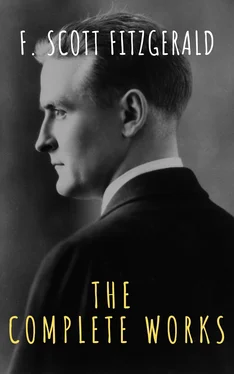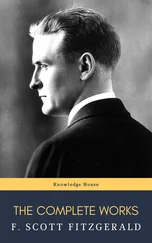Array The griffin classics - The Complete Works of F. Scott Fitzgerald
Здесь есть возможность читать онлайн «Array The griffin classics - The Complete Works of F. Scott Fitzgerald» — ознакомительный отрывок электронной книги совершенно бесплатно, а после прочтения отрывка купить полную версию. В некоторых случаях можно слушать аудио, скачать через торрент в формате fb2 и присутствует краткое содержание. Жанр: unrecognised, на английском языке. Описание произведения, (предисловие) а так же отзывы посетителей доступны на портале библиотеки ЛибКат.
- Название:The Complete Works of F. Scott Fitzgerald
- Автор:
- Жанр:
- Год:неизвестен
- ISBN:нет данных
- Рейтинг книги:5 / 5. Голосов: 1
-
Избранное:Добавить в избранное
- Отзывы:
-
Ваша оценка:
- 100
- 1
- 2
- 3
- 4
- 5
The Complete Works of F. Scott Fitzgerald: краткое содержание, описание и аннотация
Предлагаем к чтению аннотацию, описание, краткое содержание или предисловие (зависит от того, что написал сам автор книги «The Complete Works of F. Scott Fitzgerald»). Если вы не нашли необходимую информацию о книге — напишите в комментариях, мы постараемся отыскать её.
The first table of contents (at the very beginning of the ebook) lists the titles of all novels included in this volume. By clicking on one of those titles you will be redirected to the beginning of that work, where you'll find a new TOC that lists all the chapters and sub-chapters of that specific work.
The Complete Works of F. Scott Fitzgerald — читать онлайн ознакомительный отрывок
Ниже представлен текст книги, разбитый по страницам. Система сохранения места последней прочитанной страницы, позволяет с удобством читать онлайн бесплатно книгу «The Complete Works of F. Scott Fitzgerald», без необходимости каждый раз заново искать на чём Вы остановились. Поставьте закладку, и сможете в любой момент перейти на страницу, на которой закончили чтение.
Интервал:
Закладка:
( And deep under the aching sadness that will pass in time, Rosalind feels that she has lost something, she knows not what, she knows not why. )
— ◆ —
Chapter 2.
Experiments in Convalescence
The Knickerbocker Bar, beamed upon by Maxfield Parrish’s jovial, colorful “Old King Cole,” was well crowded. Amory stopped in the entrance and looked at his wrist-watch; he wanted particularly to know the time, for something in his mind that catalogued and classified liked to chip things off cleanly. Later it would satisfy him in a vague way to be able to think “that thing ended at exactly twenty minutes after eight on Thursday, June 10, 1919.” This was allowing for the walk from her house—a walk concerning which he had afterward not the faintest recollection.
He was in rather grotesque condition: two days of worry and nervousness, of sleepless nights, of untouched meals, culminating in the emotional crisis and Rosalind’s abrupt decision—the strain of it had drugged the foreground of his mind into a merciful coma. As he fumbled clumsily with the olives at the free-lunch table, a man approached and spoke to him, and the olives dropped from his nervous hands.
“Well, Amory …”
It was some one he had known at Princeton; he had no idea of the name.
“Hello, old boy—” he heard himself saying.
“Name’s Jim Wilson—you’ve forgotten.”
“Sure, you bet, Jim. I remember.”
“Going to reunion?”
“You know!” Simultaneously he realized that he was not going to reunion.
“Get overseas?”
Amory nodded, his eyes staring oddly. Stepping back to let some one pass, he knocked the dish of olives to a crash on the floor.
“Too bad,” he muttered. “Have a drink?”
Wilson, ponderously diplomatic, reached over and slapped him on the back.
“You’ve had plenty, old boy.”
Amory eyed him dumbly until Wilson grew embarrassed under the scrutiny.
“Plenty, hell!” said Amory finally. “I haven’t had a drink to-day.”
Wilson looked incredulous.
“Have a drink or not?” cried Amory rudely.
Together they sought the bar.
“Rye high.”
“I’ll just take a Bronx.”
Wilson had another; Amory had several more. They decided to sit down. At ten o’clock Wilson was displaced by Carling, class of ’15. Amory, his head spinning gorgeously, layer upon layer of soft satisfaction setting over the bruised spots of his spirit, was discoursing volubly on the war.
“’S a mental was’e,” he insisted with owl-like wisdom. “Two years my life spent inalleshual vacuity. Los’ idealism, got be physcal anmal,” he shook his fist expressively at Old King Cole, “got be Prussian ’bout ev’thing, women ’specially. Use’ be straight ’bout women college. Now don’givadam.” He expressed his lack of principle by sweeping a seltzer bottle with a broad gesture to noisy extinction on the floor, but this did not interrupt his speech. “Seek pleasure where find it for to-morrow die. ’At’s philos’phy for me now on.”
Carling yawned, but Amory, waxing brilliant, continued:
“Use’ wonder ’bout things—people satisfied compromise, fif’y-fif’y att’tude on life. Now don’ wonder, don’ wonder—” He became so emphatic in impressing on Carling the fact that he didn’t wonder that he lost the thread of his discourse and concluded by announcing to the bar at large that he was a “physcal anmal.”
“What are you celebrating, Amory?”
Amory leaned forward confidentially.
“Cel’brating blowmylife. Great moment blow my life. Can’t tell you ’bout it——”
He heard Carling addressing a remark to the bartender:
“Give him a bromo-seltzer.”
Amory shook his head indignantly.
“None that stuff!”
“But listen, Amory, you’re making yourself sick. You’re white as a ghost.”
Amory considered the question. He tried to look at himself in the mirror but even by squinting up one eye could only see as far as the row of bottles behind the bar.
“Like som’n solid. We go get some—some salad.”
He settled his coat with an attempt at nonchalance, but letting go of the bar was too much for him, and he slumped against a chair.
“We’ll go over to Shanley’s,” suggested Carling, offering an elbow.
With this assistance Amory managed to get his legs in motion enough to propel him across Forty-second Street.
Shanley’s was very dim. He was conscious that he was talking in a loud voice, very succinctly and convincingly, he thought, about a desire to crush people under his heel. He consumed three club sandwiches, devouring each as though it were no larger than a chocolate-drop. Then Rosalind began popping into his mind again, and he found his lips forming her name over and over. Next he was sleepy, and he had a hazy, listless sense of people in dress suits, probably waiters, gathering around the table….
… He was in a room and Carling was saying something about a knot in his shoe-lace.
“Nemmine,” he managed to articulate drowsily. “Sleep in ’em….”
Still Alcoholic.
He awoke laughing and his eyes lazily roamed his surroundings, evidently a bedroom and bath in a good hotel. His head was whirring and picture after picture was forming and blurring and melting before his eyes, but beyond the desire to laugh he had no entirely conscious reaction. He reached for the ’phone beside his bed.
“Hello—what hotel is this—?
“Knickerbocker? All right, send up two rye highballs——”
He lay for a moment and wondered idly whether they’d send up a bottle or just two of those little glass containers. Then, with an effort, he struggled out of bed and ambled into the bathroom.
When he emerged, rubbing himself lazily with a towel, he found the bar boy with the drinks and had a sudden desire to kid him. On reflection he decided that this would be undignified, so he waved him away.
As the new alcohol tumbled into his stomach and warmed him, the isolated pictures began slowly to form a cinema reel of the day before. Again he saw Rosalind curled weeping among the pillows, again he felt her tears against his cheek. Her words began ringing in his ears: “Don’t ever forget me, Amory—don’t ever forget me——”
“Hell!” he faltered aloud, and then he choked and collapsed on the bed in a shaken spasm of grief. After a minute he opened his eyes and regarded the ceiling.
“Damned fool!” he exclaimed in disgust, and with a voluminous sigh rose and approached the bottle. After another glass he gave way loosely to the luxury of tears. Purposely he called up into his mind little incidents of the vanished spring, phrased to himself emotions that would make him react even more strongly to sorrow.
“We were so happy,” he intoned dramatically, “so very happy.” Then he gave way again and knelt beside the bed, his head half-buried in the pillow.
“My own girl—my own—Oh——”
He clinched his teeth so that the tears streamed in a flood from his eyes.
“Oh … my baby girl, all I had, all I wanted! … Oh, my girl, come back, come back! I need you … need you … we’re so pitiful … just misery we brought each other…. She’ll be shut away from me…. I can’t see her; I can’t be her friend. It’s got to be that way—it’s got to be——”
And then again:
“We’ve been so happy, so very happy….”
He rose to his feet and threw himself on the bed in an ecstasy of sentiment, and then lay exhausted while he realized slowly that he had been very drunk the night before, and that his head was spinning again wildly. He laughed, rose, and crossed again to Lethe….
At noon he ran into a crowd in the Biltmore bar, and the riot began again. He had a vague recollection afterward of discussing French poetry with a British officer who was introduced to him as “Captain Corn, of his Majesty’s Foot,” and he remembered attempting to recite “Clair de Lune” at luncheon; then he slept in a big, soft chair until almost five o’clock when another crowd found and woke him; there followed an alcoholic dressing of several temperaments for the ordeal of dinner. They selected theatre tickets at Tyson’s for a play that had a four-drink programme—a play with two monotonous voices, with turbid, gloomy scenes, and lighting effects that were hard to follow when his eyes behaved so amazingly. He imagined afterward that it must have been “The Jest.” …
Читать дальшеИнтервал:
Закладка:
Похожие книги на «The Complete Works of F. Scott Fitzgerald»
Представляем Вашему вниманию похожие книги на «The Complete Works of F. Scott Fitzgerald» списком для выбора. Мы отобрали схожую по названию и смыслу литературу в надежде предоставить читателям больше вариантов отыскать новые, интересные, ещё непрочитанные произведения.
Обсуждение, отзывы о книге «The Complete Works of F. Scott Fitzgerald» и просто собственные мнения читателей. Оставьте ваши комментарии, напишите, что Вы думаете о произведении, его смысле или главных героях. Укажите что конкретно понравилось, а что нет, и почему Вы так считаете.












